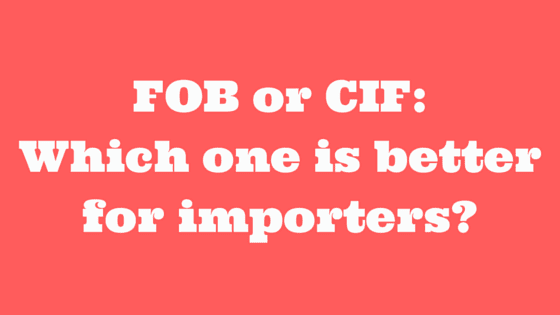The most frequently used two Incoterms, FOB and CIF, are restricted to be used in sea shipment only. They are so popular that, their usage most probably surpass remaining 9 Incoterms' usage.
But, the main question remains: Which one is better when importing goods into one country? FOB or CIF.
On this article, I will try to explain whether FOB or CIF is a better option for importers.
Professional Importers Prefer FOB not CIF
Big importers almost always buy under FOB terms. Here are the reasons:
1-By choosing FOB Incoterms, you will be able use single, long-term contracted transport company, which you know and trust:
If you are agreeing to buy under CIF delivery terms, in sea shipments, you may find yourself in a position, in which you have to deal with a different transport company almost every import operation.
This is because, typically, exporters gather 2-3 freight quotations from selected freight forwarders and load the goods with the lowest price bidder.
Which means that, even if you buy only from one supplier, you may have to deal with a different transport company with some your imports.
The chance of dealing with different logistic companies is getting higher, as you increase your import volume, buying different goods from different suppliers, from different countries.
If you buy under FOB delivery terms, in sea shipments, you will be dealing with a your own, long-time contracted freight forwarder in all of your import operations.
As an importer, even if you work with 10 suppliers from 10 different countries, your contracted freight forwarder should be able to handle the shipments.
Dealing with a single freight forwarder company has following advantages over multiple logistic companies during import operations:
- You will be able to track shipments more accurately.
- You can reach more information regarding the shipment details. Some exporters tend to ship some orders after the expected loading date. If you use your own freight forwarder, you can make sure that if your goods have been loaded on time or not.
- You can work faster with your own freight forwarder than a transport company that you are going to work for 1st time.
- You spend less time, less effort and less money.
2-By choosing FOB Incoterms, you will be able eliminate unexpected and unseen local costs:
Some freight forwarders, hopefully very limited of them, give very competitive port-to-port freight quotations under CIF delivery terms, but they demand very high destination delivery charges, such as high demurrage and detention charges.
Some freight forwarders, hopefully very limited of them, give very competitive port-to-port freight quotations under CIF delivery terms, but they demand very high destination delivery charges, such as high demurrage and detention charges.
If you work with your own forwarder under FOB delivery terms, you should not face with these kinds of inflated local charges.
3-Other Factors for choosing FOB over CIF:
- Professional importers arrange yearly cargo insurances. (Open Cover Cargo Insurance)
- Most countries collect duties from FOB prices. FOB delivery term offers duty and duty calculation advantages.
Related Pages For Further Reading:
- What are the differences between CIF and FOB?
- Understanding Incoterms: Incoterms 2010 Guide
- Guide to Import Demurrage and Detention Charges
Today, I have tried to explain whether FOB or CIF delivery terms would be more beneficial for importers. If you have anything to say, please leave a comment.


